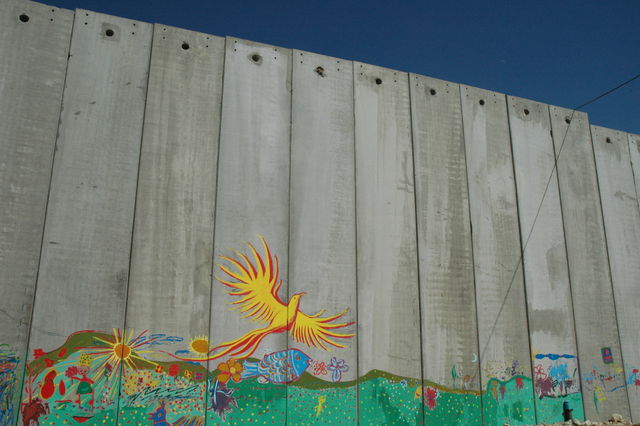Ha’Am staff writer Yaacov Tarko and Wali Kamal of Al-Talib work together to deconstruct the different meanings of the word “Intifada”
Yaacov: My relatives in Israel have been personally affected by violent attacks in the current “silent Intifada,” and one of my cousins has been hospitalized multiple times after being assaulted and beaten. So when I saw a video of protesters at UC Berkeley shouting their support for the Intifada, I reacted with shock and horror. If even in distant California people support the attackers who want me and my family dead, then nowhere on Earth can be safe.
However, when researching the topic further, I discovered that the supporters at UC Berkeley were probably not calling for violence. In the Palestinian context, the word “intifada” is used less to refer to violent attacks and more to refer to cultural resistance and nonviolent protest. In Arabic the word Intifada means “uprising”, but it is applied largely in nonviolent contexts such as the peaceful protests that brought down the dictatorship of Egypt in the 2011 Arab Spring.
“When you hear the word Intifada, what do you think of?”
Wali: I posed this question to a third year student who is Palestinian. His answer was almost curt. “It’s an uprising”. But upon prodding a bit more, I was able to gain a little bit more insight into the question.
When considering the usage of language relating to the Israeli-Palestinian conflict, it’s important to consider how that language is understood by competing narratives that vie for attention. The understanding of the word Intifada is quite different coming from the Palestinian viewpoint.
We have access to the etymology of the term under question, via the Hans Wehr dictionary of Modern Written Arabic. Intifada comes from the trilateral root word nafad, which literally means “that which is shaken off or falls off.” Words from this root share the imagery of shaking off: Nafadi describes a leafy deciduous tree that sheds its leaves in autumn; minfada describes an ashtray upon which ashes from a cigarette might fall.
Returning to our context, Intifada can be understood as an effort to “shake off” the occupation of Palestinian territories. This desire to shake off what is considered oppressive leads us to the familiar usage. An intifada is an uprising against institutions that are considered oppressive. We see this in the Arab Spring movements in Tunisia and Egypt, as those have also been oft referred to as the Tunisian Intifada and the Egyptian Intifada. These movements were markedly peaceful populous uprisings. Palestinian perspectives on the Occupation almost uniformly contend that the Occupation and its manifestations are unjust. Assuming this perspective, it starts to become apparent the desire for some kind of resistance.
Among Israelis, Intifada has come to be associated with the violent uprisings of the First and Second Intifadas. Intifada is a term that certainly has been used to describe violent uprisings. However, even if it’s been used specifically to mean violent resistance in certain contexts, it is more important in the ‘notional sense’ — it means resistance to cultural erasure and occupation.
Before Intifada had become inextricably linked with those events, it was (and still is) regarded as popular resistance, and a more symbolic spirit of resistance. It’s something that raises no eyebrows among people coming from the Palestinian perspective, simply because it does not have the same connotations as it does for Israelis.
Yaacov: In the Jewish and Israeli communities, however, the word Intifada carries implications of violence, blood, and terror. When asked what comes to mind when she hears the word Intifada, UCLA senior Rivka Cohen responded: “The visions of blood, of knives, of pain, of fear.” Leeav Nagola, a second-year student, answered the same question with the following: “I think of my family in Israel being attacked, of constant worry and fear. That’s what comes to mind.”
These reactions are typical of members of the Jewish community. The word Intifada is painted in our minds with the blood of innocents, with exploding buses and cafes, and knives in the backs of our friends and family. We have not encountered the word in any other context; we have not attached it to any of our nonviolent popular movements. To us, Intifada is synonymous with fear and death.
Further, these connotations are exploited by right-wing organizations who try to paint all pro-Palestinian activists as Hamas sympathizers who want all Jews dead. I first found out about the event at UC Berkeley (mentioned above) because the Hasbarah organization StandWithUs posted it on their Facebook page, probably in the hopes of scaring people into donating money to them. This example is typical.

